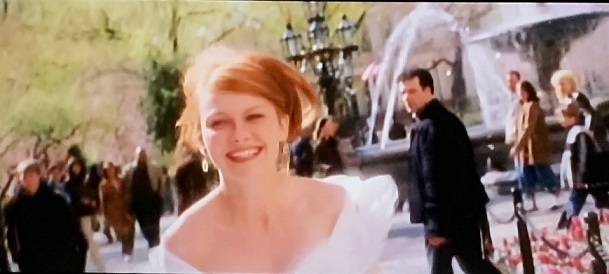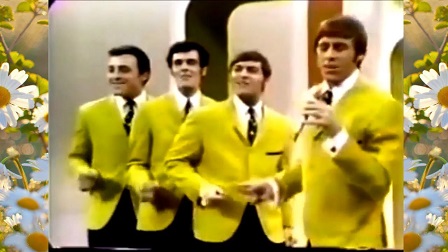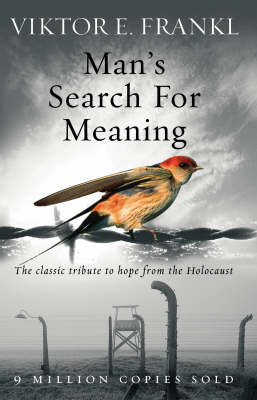|
Word Gems
exploring self-realization, sacred personhood, and full humanity
Soulmate, Myself:
Omega Point
Conclusion
Aristotle's pinnacle of happiness: "I got my girl, who could ask for anything more?" |
return to "contents" page
I’m indebted to Mortimer Adler, a very significant teacher in my life.
Many years ago, I learned from him something of the philosophy of happiness. His insight and research allowed me to write my “Happiness: 1-Minute” essay. Here's a portion of it now:
summum bonum, the supreme and complete good
It was Aristotle who gave us the term, summum bonum, the supreme and complete good. But is this highest form of happiness a single good or a full array of goods?
Though the person who says "I feel happy" is really saying "I feel satisfied," that satisfaction usually doesn't last very long. There is a great difference between "feeling happy" at a given moment and "being happy" for a lifetime -- a difference between a "good time" and a "good life." (However, lest anyone misunderstand, a "good life" will offer ample opportunity for a "good time.")
Boethius, in a famous saying, expresses that happiness is "a life made perfect by the possession, in aggregate, of all good things." Adopting this definition, happiness becomes not a particular good but the sum of all goods.

The summum bonum is the final and great good and, as such, is sought for its own sake, not for the sake of something else. If we ask someone why he or she wants to be happy, it will be difficult for them to respond with anything other than something like "I just do"; we want to be happy as an end in itself, not just to get something more or something else.
True happiness is the final end of all of our desires.
|
happiness cannot be found in one good time, or even in a lot of them, but only in a whole good life
Editor’s note: the following is from preliminary paragraphs of Adler's An Introduction To The Great Books And To A Liberal Education, the fourth reading. It serves as excellent restatement and synthesis of topics discussed above.
Happiness is the theme of the first book of Aristotle’s Nicomachean Ethics. The fact that happiness is a subject of universal interest confirms Aristotle’s most fundamental insight about it: all men want to be happy, and everything else they want they seek as a means of becoming happy.
Among the things that men call good and strive for, happiness stands out as the one good which, if fully possessed, would leave a man satisfied and at rest. No one would call himself completely happy if anything essential to his well-being remained beyond his grasp. Happiness must, therefore, be the sum of all good things.
This, in brief, is the meaning of happiness that Aristotle sets before us, not as his own definition of it, but as the sense of it which everyone shares. Once we acknowledge this, as we must, we realize how often we misuse the word when we say, in a joyous moment, that we feel “happy” or, in a sad one, “unhappy.”
Life is full of good times and bad, moments of joy and sadness, but if happiness is the totality of goods, it cannot be found in one good time, or even in a lot of them, but only in a whole good life.
It is this fact about happiness which helps us to understand why the Declaration of Independence talks about the “pursuit of happiness” rather than the enjoyment of it as a natural right. The pursuit of happiness takes a lifetime and only when the race has been run can we look back and say whether it has been well run or not. The first book of the Nicomachean Ethics proposes the standards by which we can judge whether or not it has.
|
Much more could be said, and you’ll want to read these essays in their entirety, but I still recall my excitement, many years ago, to learn from Adler how the “supreme happiness” might be determined.
Think of the things we like. Good coffee, a good book, travel, a nice house, money, etc., etc. Now, if we ask the question, “Why do you like coffee?” or “Why do you want a nice house?” and if we pose the same query for all goods in our lives, our answer will inevitably issue as some form of, “I like it because it makes me happy.” There may be other reasons, but if we peel back the layers of these secondary reasons, it is very difficult not to end up with the answer, “I want it because it makes me happy.”
And so we have to agree with Aristotle in his assessment that most everything we do devolves to an attempt to secure happiness for our lives.
But when we ask this question of happiness itself, we get a different answer. In other words, if we ask, “Why do you want to be happy?” then, we’re forced into some sort of statement like, “I want to be happy because… I just do… I want to be happy because I want to be happy.”
And with this terminal point in the enquiry, we sense we’ve reached the end of our searchings. Happiness itself is not a means to something else. Happiness, just as Aristotle asserted a long time ago, is what human beings are really after.
But, what about your Twin? Is she just a means to an end, too? - just a convenient stepping-stone to happiness?
The quick answer is no, but this is a difficult question and will require some soul-searching to get it right.
Before we attempt an answer, let’s consider the lyrics of the 1967 hit, “I Got Rhythm” by Bob Miranda’s “The Happenings.”
|
'I got my girl, who could ask for anything more?'

Bob Miranda’s “The Happenings”
performing “I Got Rhythm” on the
“Smothers Brothers Show” (1967)
see the video
|
In this fast and troubled world
We sometimes lose our way
But I am never lost
I feel this way because
I got rhythm
I got music
I got my girl
Who could ask for anything more
I got good times
No more bad times
I got my girl
Who could ask for anything more
Old man trouble
I don't mind him
You won't find him
'Round my door
I got starlight
I got sweet dreams
I got my girl
Who could ask for
Who could ask for more
|
|
SongFacts: "I Got Rhythm"
"This is one of the songs composer George Gershwin and his brother Ira wrote for the musical Girl Crazy, which opened at the Alvin Theatre, Broadway, on October 14, 1930. According to Gershwin biographer Deena Rosenberg in Fascinating Rhythm, the young Ethel Merman 'belted I Got Rhythm' with an earthiness new to Broadway... On the opening night of Girl Crazy, Merman stopped the show and had to repeat I Got Rhythm multiple times."
|
|
'I got my girl, who could ask for anything more?'
Does this mean that 'my girl' is the summum bonum, the supreme and complete good?
In many other articles, we’ve discussed the fleeting nature of romantic love in this world.
John and Mary, at their best, experience a thrilling episode of “who could ask for anything more?” For a while, it almost seems like the inner loneliness has actually been shut out of one’s life. For a time, they almost believe that they will be the ones to succeed where others have failed - to live “happily ever after.”
But how quickly the “glitter begins to fade.”
And yet we have songs like the Gershwins’ “I Got Rhythm” which offer no hint that the “starlight,” the “music,” the “sweet dreams” are meant but for a season. Poetic license on a romp? – or do artists, philosophers, and mystics sometimes, ever so briefly, catch a vision of something more? and something real.
|
the final wisdom, proclaimed by so many poets, artists, and thinkers

Dr. Viktor Frankl, Man's Search for Meaning: Recounting an Auschwitz experience:
We stumbled on in the darkness, over big stones and through large puddles, along the one road running through the camp. The accompanying guards kept shouting at us and driving us with the butts of their rifles... But my mind clung to my wife's image, imagining it with an uncanny acuteness. I heard her answering me, saw her smile, her frank and encouraging look... for the first time in my life I saw the truth as it is set into song by so many poets, proclaimed as the final wisdom by so many thinkers. The truth - that love is the ultimate and the highest goal to which man can aspire. Then I grasped the meaning of the greatest secret that human poetry and human thought and belief have to impart: The salvation of man is through love and in love. I understood how a man who has nothing left in this world may still know bliss, be it only for a brief moment, in the contemplation of his beloved...
|
the sense of 'I got my girl, who could ask for anything more?' is not a bio-chemical response of fevered brain, suffering under 'super-normal stimulus'
Dr. Frankl is not talking about a Niko-Tinbergen “super-normal” stimulus employed by Mother Nature for species perpetuation. The real love far transcends the bio-chemical programmed response of John and Mary or that of other mammals on Animal Planet.
'I got my girl, I got starlight, music, and sweet dreams'
In the four essays exploring the nature and meaning of “Beauty,” we discussed that perceptions of beauty open a portal for the soul to express itself. Each for the other, Twin Souls offer an expanded vista to the beauty of the soul, the beauty of the “made in the image” destiny, the beauty of what it means to access the “inner riches.”
'I got my girl, who could ask for anything more?'
In “The Wedding Song” we learned that the “life” which Twins “draw” from each other represents an evolutionary and spiritual advance. See the “Earthrise Restatement.”
This “life” reaches for highest pinnacles of happiness, joy, and intimacy. Notice, especially, that they must “draw” this from each other. This means that when Twins say “I got my girl, who could ask for anything more?” it will seem like this apex of happiness is coming from one’s mate. Well, that’s part of reality, however, a clearer perception leads us to understand that one’s sense of awe and wonder of the sublime here, in truth, is being generated from the beauty of one’s own soul.
Each Twin, each for the other, holds the key to unlock the long-barred doors of the “inner riches” wherein resides the previously inaccessible joy and happiness of the mind of God. Twins “draw” this from each other.
And so, is your Twin Soul just a means to an end, just a stepping-stone to happiness?
In some mystical way, your Twin Soul is part of you, is not separate from you. And if you “go within,” you will sense the truth of this statement when you compare her “energy” with that of every other external item in the world.
To ask the question, is your Twin a means to some end of happiness? would be like asking is your own life, your own being, a means to some other goal of happiness? It doesn't fit.
Twins are called “Twin Souls” because, in some way or manner, presently unclear to us, they are connected, and have been in union since “the soul nursery,” as is suggested by certain afterlife entities. This seems and feels correct to me.
|
Restatement: the summum bonum and authentic romance – why does it feel so good to be in love?

Kairissi. It seems that we’ve talked about this a hundred times.
Elenchus. Do we know the answer then?
K. I’m still waiting for you to tell me.
E. Alright, so let’s try one more time.
K. You know, when you start listening to love songs – all hundred thousand of them – they all say the same thing: love feels so good.
E. Even John-and-Mary love, even bio “super-stimulus” love, feels so good.
K. As the French say, "C'est si bon!"
E. "It's so good!"
K. But that’s just a shadow and echo of the real thing and doesn’t last.
E. But even though it doesn’t last, it teaches us something. The procreative act could have been designed differently. It would have been possible to reproduce asexually.
K. Like spores floating in the air.
E. Now we know why they’re airborne. The secret life of spores.
K. (small smile) Uh-huh. You do bring up a good point, though. There would have been more efficient ways to propagate the species. But it appears that efficiency concerns were not the only consideration.
E. What was that “consideration”? And what's behind this universal euphoria, this intoxication? Why does being in love feel so good?
K. Maybe we can get a first clue from other things that feel good. I’m thinking of a song by Jim Croce. He’s a Southern boy living in New York, and he laments, “I’ve been here about a year and I’ve never once felt at home.”
E. He’s remembering “home and hearth” and the good feelings of family far-away.
K. The memory of absent dear ones, recalling to mind past good feelings, tells us, I think, how things were meant to be.
E. And in John Sebastian’s song “Full Measure” he sings of the good feelings we know at Christmas time when we give gifts to others.
K. A spirit of giving makes us feel good. What does this say about us?
E. I think it says that we feel and know our truest and most natural selves when we live charitable lives.
K. In other words, when we live according to the “blueprint” of our lives, what we were meant to be and do, we feel good. We're "in the flow" of life.
E. There’s a phrase about being “hard-wired” to be something. It’s like an electrical circuit: the current flows when the circuit is not broken.
K. When the circuit isn’t broken, when the current flows, we feel good.
E. Feeling good can be an indicator of reality and destiny, but we also know that there’s a faux version of this that’s very deceptive.
K. Yes - there are many temporary elations that lead to misery: drink, drugs, criminal activity of all sorts; the list goes on.
E. And in reference to romance, the Beatles offered the lyric: “the love which has a nasty habit of disappearing overnight”; meaning, “it felt so good early on, but then it just fell apart.”
K. It would seem that some good feelings represent mere momentary gratification of bio-stimulus craving; no big deal, even earthworms experience this.
E. Or the airborne spores.
K. But there’s another, far more lofty, sense of feeling good which gives direction to the soul. It tells us we’re on the right path, leading to what we were meant to do and become.
E. Tell me more of this lofty way.
K. In earlier discussions, we said that "all expressions of oneness are pleasurable" - from a sense of affinity with creation, to common social interaction, all the way up the line to Twin bondedness. We discussed this at length in "The Wedding Song."
E. Yes, very good. So where does this leave us then? We've said that the pinnacle good-feelings of being in love reflect what is most natural to us, what we're hard-wired for, and the highest level of oneness. Is there anything else?
K. Nothing, except to point out the quintessence of our natures, the epicenter of our destiny, the grand reason why all these things should resonate so deeply with us.
E. Spell it out for our readers, Kriss.
K. As we’ve learned, the ancient Spirit Guides speak of “Mother-Father” God. In some sense, not altogether clear to us, a female-male energy constitutes the spirit of God. And when one particular girl, specifically created for one particular boy, enters relationship with her counterpartal other, they will feel good, very good; in fact, they’ll feel better than at any other time in their lives; moreover, it's a feeling that remains, even, intensifies over time, and does not abate. And I would also venture to further clarify that their sense of “feeling good” becomes an indicator of fulfilling their “made in the image” destiny: they’re becoming more and more like Mother-Father God - which is the purpose of life.
E. This particular girl and boy of whom you speak - will they find themselves airborne in this intoxicated “feeling good.”
K. (small smile) Probably.
E. How then will we ever tell them apart -- this particular boy and girl -- from the fraternizing spores?
K. Oh, that's easy - the spores eventually float back to earth, but they remain airborne. (smiling)

|
|
Editor's last word:
Aristotle’s summum bonum and “I got my girl, who could ask for anything more” seem to be speaking of the same sentiment.
In life, at times, if we’re fortunate, we experience various goods as objects of desire: the good coffee, the good book, the good vacation trip – but none of these would so satisfy us as to prompt a response of “I’m whole now, my desires are filled to the top, I’m in need of nothing.” No, not hardly.
There is only one experience, if we are so blessed as to encounter, which draws the unqualified exultation, “who could ask for anything more?” Is it not interesting and most instructive to us that only a particular female-male interaction, the sacred “made in the image” dynamic, fills one’s desire?
What does this say about who we are, how we shall live, and where we're going? The three-part writing, “The Inferential Life,” speaks of gaining “a natural modus vivendi, a natural religion, a natural wisdom" as we glean from Nature a roadmap to "what's real." The primary desires of the soul whisper to us, and reveal, our destiny.
Athanasius Kircher: “Whoever has the desire to pursue philosophy correctly should look to Nature's Archetype in every matter, so that by taking up Ariadne's thread in her intricate labyrinth [that is, finding one's way out of a maze] he may keep himself safe and secure from wrong turns and deviant paths.”
|
postscript
K. Let’s preface our comments by saying that we’re offering this postscript a year or more after the completion of the above writing.
E. “Who could ask for anything more?” – apparently, we could.
K. We don’t want to speak against anything that was stated earlier. It’s just that, in the last few days, with the addition of a new article,
Kairissi and Elenchus discuss how existential beauty might lead us to spiritual maturity
and a clarification, for us, concerning old themes on the subject of love, we feel compelled to add a certain modification to what we thought we knew as a final word.
E. Let that be a lesson to us – there are no final words.
K. So, what do we want to add here? Why should I complain with “I’ve got my guy, who could ask for anything more?”
E. The answer is profoundly subtle, and must be experienced to know its impact. Our readers will need to review the new article for the full explanation, but, essentially, the highest heights of intimacy are achieved with a sense of no separation, a total existential oneness. This cannot be won by ordinary levels of consciousness and requires an elevated state of mind.
K. The concept of “my guy” and “my girl” speaks to utterly delicious possessions, but, it must be noted, in these perceptions hide a degree of separation, of subject and object, of lover and beloved, and, strange to say, this creates a barrier to ultimate oneness.
E. We invite you to review our recent writing for plenary discussion on this important topic. We count it as one of our greatest insights into the nature of true love and marriage.

|



